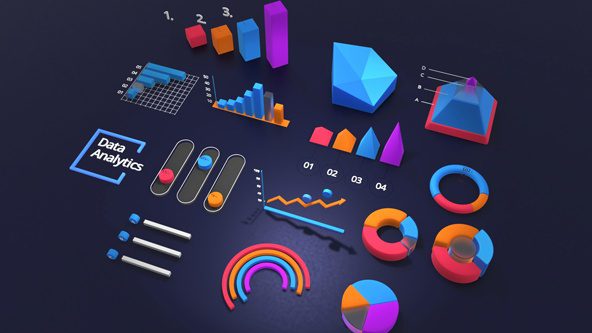Analytics and EBHR
HR and Big Data Rule 7 – Develop data comfort in the whole HR function
Nick Holley, CRF Director of Learning
There is a danger that the world of data analytics is far removed from the HR organisations of the past. Where there has been a legacy of policy, compliance and process – this is new territory. We have to move from being pure HR experts to business experts who use analytics to drive our actions.
CRF Learning’s latest On Demand course Workforce Analytics and Storytelling will develop you and your team’s confidence in harnessing data to drive valuable insights around business issues, influence decision making and drive organisational performance. Preview exclusive exercises and learning modules taken directly from the course now, ahead of its full launch later this month.
HR is the guardian of the people and the organisational element of strategic risk, and deployment of strategy via people and organisation is the ultimate differentiator of business success in an environment where everyone has a strategy. Therefore, if HR is not providing these insights, nobody is, and the business is left exposed to risk.
We have to think in terms of business effectiveness, not HR process efficiency, and use data accordingly. We have to move beyond our focus – for instance how diversity drives performance, or how engagement drives productivity. If we don’t, there is a danger we will do the wrong things even though we’ll do them in a more data-driven way. Yet, the majority of HR professionals don’t seem to get it.
A MIT Sloan Management review survey of 3,000 global executive managers found that less than 25% of CHRO’s are using analytics to make future workforce decisions. Similarly research from Josh Bersin fids that only 6% of HR departments believe they are ‘excellent’ in analytics, whilst more than 60% feel they are poor or behind. Furthermore, 85% of respondents to KPMG survey of 418 global executives said that their HR team doesn’t excel at providing insightful and predictive analytics.
In speaking to vendors, they said they find that even where the majority of senior HR people get this, only 50% practice it. This 50% will adapt and thrive. They like data and lots of it. They use their HR experience and instincts to test the validity of the data. They know it makes them more credible and is an opportunity to impress the business. They make the case to the business not in HR terms but in terms of meeting your targets.
In many cases the 50% who don’t practice it see it as a discrete project rather than a core part of their job. They make last minute requests for data (‘I have a meeting with the CEO, can you turn this around in the next 24 hours?’) but without a real understanding of what the hypothesis is that they are testing, and without a sense of the business driver and resultant action they will take.

On Demand Courses
Enrol on our on demand courses including Building a High-Performance Culture, and Workforce Analytics and Storytelling
In one example when the data analytics team pushed back on 14 requests for data from within HR, asking what the hypothesis that was being tested actually was, 13 of the requests disappeared. Many analytics teams feel frustrated that the HR people at the interface don’t understand either the business issue or the data analytics piece. In many cases HR business partners will simply use the excuse that the line wants the analysis. They can’t go direct to the line or they will alienate their HR business partners but if they don’t go round them they get stuck in generating meaningless HR data decks that no one reads, and which lead to no value-added actions.
The question is, if these HR business partners can’t change, are there roles that play to their strengths or can we configure roles so they can add value? In my view, whatever the answer, it is a lack of data rationality that will restrict their career progression. This means HR, as a function, has to educate its people to embrace this new agenda.
As one HR Director told me “Make sure people in the HR community are: a) aware of it, b) see it as an opportunity, c) have the right sort of skills to be able to work with data.”
But the key is how to get people to practice it as a core part of their job, so they build confidence little by little.
To quote the 2011 McKinsey report Big Data: The next frontier for innovation, competition, and productivity: “In the case of data-savvy managers and analysts in a big data world, the level of training and mathematical aptitude is much lower than that required for deep analytical talent. People in these roles simply need enough conceptual knowledge and quantitative skills to be able to frame and interpret analyses in an effective way. It is possible to develop such skills through a simple course in statistics and experimental design. A basic statistics program or a series of classes in data analysis at a local college or university, for instance, could create a team of highly motivated managers and analysts that could begin this transformation.”
The key is that the profile of the business partner must change.
“You need a new skill set in HR to 20 years ago: more hard edged, more numerate, more commercial, more blurring of skill sets to be successful in business and in HR,” said one CHRO. “To too many it’s not interesting. They shy away from it because they aren’t interested.”
Another HR executive added: ‘The true HR pro of the future has got to be a great project manager, business person, analyst and got to be able to negotiate and influence. When I look around here an awful lot of them don’t fit the bill even at senior levels.’
HR needs to look to a different talent pool, looking to recruit from MBA programmes with an HR element but also with a strong commercial and data bias rather than from the usual targets. Or, looking into the line to recruit people who have this natural bias. If you make the roles interesting, then few will want to go back as the agenda is potentially so rich. Indeed, if you move the function closer to the business, then an HR career becomes more attractive to a wider potential population. This sends a strong message. If the data-rational people are being recognised and promoted, then it creates momentum.
Ultimately, as one Group HR Director told me: “Without exception when I look at the performance of our high-potential people in HR – they are strong at analytics.”
Again, it doesn’t mean we are looking for data scientists but some of the data-rational qualities that haven’t always been seen in HR should play a part. The key is that it’s not enough to build the technology infrastructure and the analytics team. You have to work with the whole of HR to raise the importance and then the capability of the function to work with data.
MEMBER LOGIN TO ACCESS ALL CRF CONTENT





